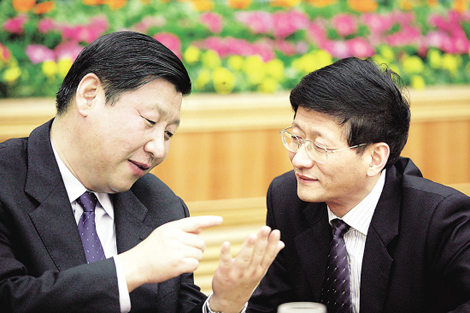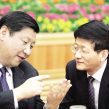
Binding the Baton: Expanding Police Power, Improving Accountability
Publication: China Brief Volume: 13 Issue: 10

Since Xi Jinping’s assumption of the posts of Chinese Communist Party (CCP) General Secretary and commander-in-chief last November, much attention has been paid to his instructions about raising the army’s ability to “get ready to fight and to win wars.” A recent spate of reshuffles in the political-legal (zhengfa) departments—which encompass the country’s police forces as well as the courts and prosecutor’s offices—however, has shown that the new supremo is equally determined to strengthen the nation’s “preserving [socio-political] stability” (weihu wending, or weiwen) apparatus. While zhengfa units including the Ministry of Public Security (MPS) have been given more authority, measures have been taken to boost internal checks and balances so as to curb corruption and abuse of power particularly among regional-level police officers. Moreover, the ironfisted implementation of the law has been coupled with more emphasis on defusing social contradictions on the spot.
The heart of the nation’s zhengfa establishment is the Central Political Legal Commission (CPLC), which is headed by Politburo member and former-Minister of Public Security Meng Jianzhu. Meng reports to Xi, who is the first General Secretary in recent memory to exercise direct control over the police apparatus (“All the General Secretary’s Men: Xi Jinping’s Inner Circle Revealed,” China Brief, February 15). That the powers of the CPLC have been enhanced was evidenced by the April appointment of Wang Yongqing as the commission’s Secretary General. Wang, aged 53, who is a former director of the General Office of the State Commission for Public Sector Reform, simultaneously was named a Deputy Secretary General of the State Council. This was the first time that a top CPLC cadre was given a senior slot in the central government (Xinhua, April 23; Chinapeace.org [Beijing] April 23). The concurrent appointment means that the CPLC, which is a party organ, can better supervise and coordinate the activities of zhengfa-related central government units, particularly the Ministry of Public Security and the Ministry of State Security. Until this development, the linkage between the CPLS and government departments mainly manifested itself in the fact that the Minister of Public Security—or national police chief—doubles as the CPLC’s Deputy Party Secretary.
More powers are being given the Ministry of Public Security. In the topmost echelon of most State Council departments, there is only one senior cadre—usually the minister—who is a member of the CCP Central Committee. In the MPS, Minister Guo Shengkun as well as two of his deputies, Yang Huanning and Li Dongsheng are Central Committee members (“Centralized Power Key to Realizing Xi’s ‘China Dream’,” China Brief, March 28). Yet efforts are at the same time being made at least at the regional level to introduce checks and balances so as to combat abuse of power. This is partly as a result of high-level soul-searching in the wake of the scandal involving former Chongqing police chief Wang Lijun. In February last year, Wang, a much-decorated officer, sought asylum in the U.S. Consulate in Chengdu. Seven months later, the former ace policeman was sentenced to 15 years for crimes including taking bribes and perverting the course of justice. During the same period, a number of senior provincial police officers were detained on graft-related charges (People’s Daily Online, September 25, 2012; Xinhua, September 24, 2012).
Xi and CPLC Secretary Meng have decided to speed up the process, which first began in the late 2000s by ex-president Hu Jintao, of phasing out the practice of appointing the same cadre as both regional head of police as well as secretary or deputy secretary of the provincial or municipal zhengfa committee. Up to 2008, police chiefs doubled as the zhengfa secretaries of more than half of China’s 31 provinces and directly-administered cities. By the end of 2002, this personnel tradition only existed in eight provinces. After the National People’s Congress held last March, only the five provinces of Anhui, Hebei, Gansu, Ningxia and Hunan have stuck to this convention of “double appointments” (Ta Kung Pao [Hong Kong] May 2; Sina.com, May 2; Govlaw.com.cn [Beijing], August 7, 2012) Under the new scenario, the heads of provincial or municipal police departments are under the supervision of both the zhengfa secretary of the same jurisdiction as well as Beijing-based MPS leaders.
That constraints have been put on the authority of regional police chiefs also is evidenced by the growing number of provincial and municipal police chiefs who have concurrently been appointed assistant governors and assistant mayors. Before the 18th Party Congress, the bulk of regional heads of police enjoyed the higher ranking of deputy governors or deputy mayors. After the NPC, the heads of the provincial public security departments in the provinces of Guizhou, Liaoning and Jiangsu— respectively, Sun Licheng, Wang Dawei and Wang Like—were named assistant governors of these provinces. Similarly, Bai Shaokang, the head of the Shanghai Public Security Bureau, was given the concurrent title of Assistant Mayor of Shanghai (Xinmin.cn [Shanghai], April 11; China News Service, April 3; China Daily Online, April 3).
At the same time, the professional qualifications of central- and provincial-level zhengfa personnel have been raised. Take, for example, the newly-appointed CPLC Secretary General Wang Yongqing. A native of Jiangxi Province, Wang is a graduate of the Law School at Jilin University, where he obtained the degree of Doctor of Laws. In 2006, Wang spent a semester at Harvard’s Kennedy School of Government. Among the newly-appointed regional police chiefs, Guizhou’s Sun Liping stood out as another cadre who had received training in a U.S. university. While Sun, aged 50, was not a law graduate, he spent more than 20 years at the Central Commission for Disciplinary Inspection, which is China’s highest-level anti-graft organ. In 2004 and 2005, Wang attended public administration courses at Duke University (CCTV News, April 23; People’s Daily Online, April 2).
Higher professional requirements also apply to several other senior appointments elsewhere in the labyrinthine zhengfa establishment. Take, for instance, the new President of the Supreme People’s Court Zhou Qiang. A graduate of the Law School of Southwestern University of Politics and Law, Zhou, aged 53, spent a decade in the Justice Department in the 1980s and 1990s (Court.gov.cn [Beijing], April 2; China News Service, March 15). He is thus much more qualified than his predecessor, Wang Shengjun, a former provincial police chief who had never attended law school or held a professional legal position.
While the new zhengfa team has made significant personnel and organizational changes, it is basically cleaving to established practices regarding operational doctrines and approaches. In line with the imperative that President Xi has put on upgrading the technological standards of both the army and police, more resources are being spent on developing and procuring state-of-the-art equipment. Under new chief Guo Shengkun, the MPS is speeding up the five-year-old national “informatization drive” that is geared toward using IT-enabled mechanisms to crack down on crime as well as to boost surveillance over destabilizing social elements (“Informatization Drives Expanded Scope of Public Security,” China Brief, April 12). By early this year, the informatization drive had reached the remote Tibet Autonomous Region. In a recent speech, Tibet Zhengfa Secretary Deng Xiaogang pointed out that “the construction of an informatization system is essential to raising [the region’s] ability to safeguard stability and manage society in the new era” (Chinapeace.org.cn, March 24; Tibet Daily, March 23).
More emphasis than ever is being put on adopting a masses-oriented approach to weiwen. Taking a leaf from Chairman Mao’s “people warfare,” the public security (police) and state security (intelligence and counterespionage) apparatus has since the 2008 Olympics been encouraging ordinary citizens to help improve law and order through means including reporting potential criminals and “suspicious characters” to the police. In a recent inspection trip to Hebei, CPLC Deputy Secretary General Chen Xunqiu asked local zhengfa cadres to do their utmost in encouraging grassroots-level and masses-based units to participate in regional weiwen projects. Chen indicated “grassroots village organizations, self-government organizations of the masses as well as [rural] economic cooperatives” should play a bigger role in supplementing the police in enhancing social harmony and rooting out destabilizing elements (Chinapeace.org.cn, April 12; Jschina.com.cn [Nanjing], April 1).
While touring Zhejiang Province last month, CPLC Secretary Meng also laid stress on using the “mass line” approach to upholding law and order. “We should raise our ability in working with the masses,” he told local police and judicial cadres, adding “We should further consolidate the construction of a grassroots foundation for zhengfa-related [tasks] as well as the comprehensive rectification of law and order.” Meng in particular lauded the “Fengqiao Experience.” This is a reference to how cadres in the town of Fengqiao, Zhejiang Province, managed to defuse “contradictions within the people” as well as disputes between cadres and the people by quickly resolving them on the spot. 50 years ago, Mao was so impressed with Fengqiao that he instructed security units nationwide to learn from the small town’s cadres and police officers. Following Mao’s spirit, Meng summed up the Fengqiao experience as “preventing small incidents from being heard outside the village and preventing big incidents from spreading beyond the town” (Legal Daily, April 28; People’s Daily, April 28). Given that China is hit annually with more than 150,000 instances of riots and civil disturbances, local officials who fail to prevent “mass incidents” from snowballing into headline-making national crises are liable to be demoted or fired.
Despite apparent measures taken by zhengfa authorities to minimize “contradictions among the people,” the past few months have witnessed a plethora of cases that seem to point to police brutality and the miscarriage of justice. For example, security personnel guarding Liu Xia, the wife of Nobel Prize-winning dissident Liu Xiaobo who has been illegally been put under house arrest, have routinely roughed up Hong Kong and foreign reporters who try to visit her. Last February, police tried to put pressure on Anhui-based dissident Zhang Lin by preventing his ten-year-old daughter Zhang Anni from going to school. Last month, judicial and prison officials in Shandong Province refused to give medical treatment to Chen Kegui, the nephew of blind lawyer Chen Guangcheng. The younger Chen, who was serving a three-year jail term that is widely interpreted as indirect punishment for his uncle, badly needed an appendicitis operation (Ming Pao [Hong Kong] April 30; VOA Chinese Service, April 29). In a teleconference with zhengfa cadres soon after the 18th Party Congress, Xi urged them to achieve goals including “a peaceful China, a China that is ruled by law, and building up a corps of officials that pass muster.” The party chief also made pledges about “rectifying the police force with severity and resolutely combating [the phenomenon of] unjust law enforcement” (Xinhua, January 7, China News Service, January 7). Given these abuses, the onus, however, is on both Xi and Meng to show that personnel and policy changes in the zhengfa system will serve to promote social justice rather than merely ensuring the CCP’s monopoly on power.





